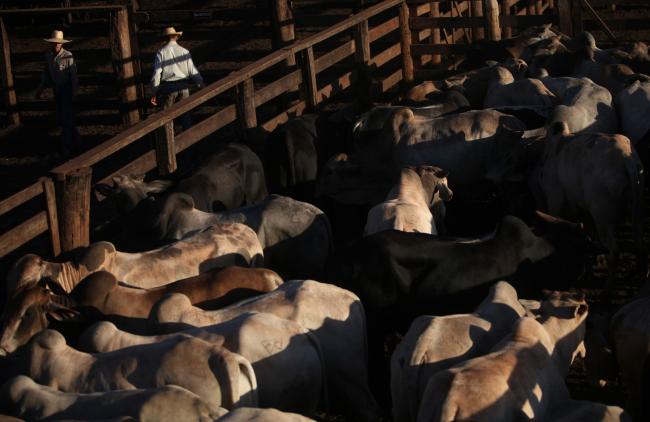(Bloomberg) -- The world’s second-largest beef supplier is tapping the market for bonds aimed at protecting the environment as meat companies face growing criticism for contributing to climate change.
Brazil’s Marfrig Global Foods SA, with operations spanning South America and the U.S., is selling as much as $500 million in so-called transition bonds, an instrument that could help less-than-green firms including oil companies, coal miners and agricultural businesses. Bookrunners include BNP Paribas (PA:BNPP) SA, ING Groep (AS:INGA) NV and Banco Santander (MC:SAN) SA.
Under the rules of the overseas sale, Marfrig is committing to using proceeds to only buy cattle from ranchers in the Amazon (NASDAQ:AMZN) region who comply with non-deforestation and other sustainable criteria such as animal welfare and fair-labor practices, according to Chief Financial Officer Marco Antonio Spada. The company sources about a fifth of the cattle it sends to slaughter from producers in that area.
Marfrig is seeking to bolster its green credentials at a time when the meat industry is being thrust into a harsh spotlight for its greenhouse gas-footprint. Cows fuel global warming by contributing methane to the atmosphere, and grass cattle ranching is cited as the main cause for the increasing destruction of the Amazon forest in Brazil.
Meatless Meat
In the U.S., plant-based protein products -- which are seen as greener -- have become an increasingly popular alternative to meat eaters, with startup Beyond Meat Inc. now worth almost 12 times more than Marfrig.
“Investors have been increasingly concerned about sustainability. We want to show a little of what we’re doing,” Marfrig CFO Spada said in an telephone interview.
Agriculture accounts for 40% of land use, 30% of greenhouse-gas emissions and 70% of freshwater consumption, UBS Global Wealth Management said in a report this month, citing the United Nations. And with demand for meat rising globally, farmers, ranchers and agribusiness are facing calls to do more to protect the planet.
Marfrig has complied for seven straight years with a 2009 agreement not to buy cattle from newly deforested areas in the Amazon region, the beef supplier said last month. Purchasing will be even stricter under the bond rules, with monitoring also covering indirect suppliers, Spada said. In May, the company hired Paulo Pianez, a former executive at Carrefour (PA:CARR) SA, as sustainability director.
Green-bond issuance topped $100 billion in the first half of the year, up from $66 billion in the same period of 2018, according to data compiled by Bloomberg. While investor demand remains strong, non-financial companies fit to issue these notes are heavily concentrated in the energy sector.
The transition bonds will help reduce entry barriers in sustainable financing for sectors including agriculture and open dialogue between companies and investors aligned with environment, social and governance criteria, according to Daniel Shurey, head of green finance at BloombergNEF.
“The agriculture sector has really struggled with conventional green bonds,” Shurey said in an interview. “Transition finance and behavior-based sustainable finance is far more suitable for it.”
But “as these companies continue on the transition path, they will need to do more to prove that they are going beyond business-as-usual decarbonization,” he said. “And investor expectations will evolve too.”
Agribusiness giant Cargill Inc. last week committed to reducing the environmental impact of its American beef operations by 30% by 2030, the equivalent of removing 2 million cars from U.S. highways for a year.
“The world is changing, and it would be stupid not to see it,” Marfrig’s Spada said.
